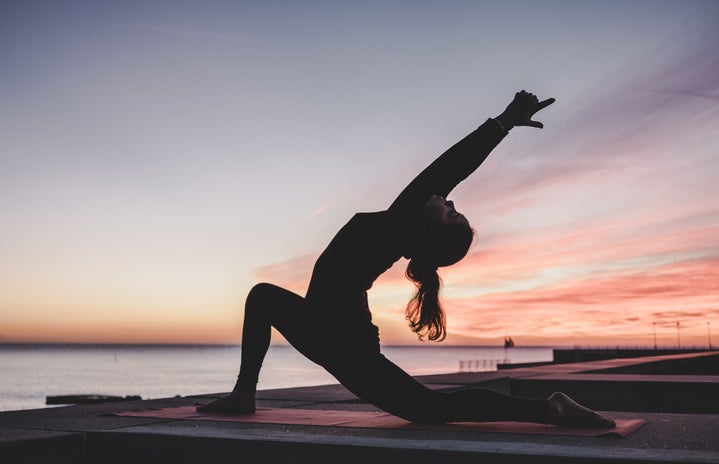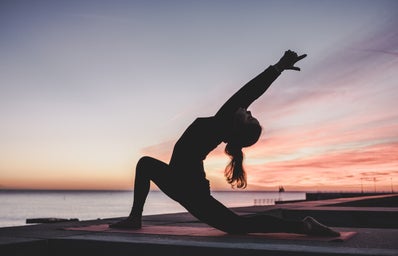We have probably all heard of the “No Excuses” rhetoric in the world of fitness: Stop whining, get stuff done; your biggest enemy is yourself; and no, you must go to the gym, even if you don’t feel like it.
But after holding myself up to the expectation of unwavering motivation and totally consistent workouts, I saw that the reality of going to the gym involves much more than just having no excuses. For us women, in particular, the menstrual cycle plays an important part in how we feel during exercise (as well as other aspects of life).
This is not to say that we should just accept that we’re subject to fluctuating hormones. Rather, learning more about my own cycle has greatly helped me understand why my body feels a certain type of way on a certain day, and how I can make adjustments to my routine accordingly.
If you find yourself feeling vastly different from one workout to the next, it might be a good idea to explore your body’s response to the different stages of the menstrual cycle. Here are some tips:
(Note that these suggestions are based on studies and my personal experience, and definitely vary from person to person!)
Menstrual phase (typically day 1 to day 5)
- What is it?
The menses phase is the time when the lining of the uterus is shed from the vagina. More simply, it’s the time of your bleeding and lasts about a week, although it may be shorter or longer depending on the individual.
- What are the symptoms?
Common symptoms during this phase include cramps, bloating, tender breasts, headaches, back pain, mood swings, fatigue and other general discomforts associated with the period.
- What are some adjustments I can make?
Generally, light exercise is recommended, such as light yoga, stretching and walking. On top of helping you stay active, these might also help ease some of your period symptoms — I do find myself feeling better over the cycle if I do some light exercise, even if it sounds like the last thing I want to do on such a lethargic day.
Other times, though, I just rest during at least the first two days of menstruation, especially if the bloating and cramps are bad. After that, once the symptoms are relieved and I feel well enough, I may return to strength training, aiming for 70-80% of my usual intensity.
Follicular phase (the week after menstruation)
- What is it?
You’re now entering approximately day 6 to day 14 of your cycle, and your estrogen level increases. The lining of the uterus thickens, and follicles — small sacs of fluid each containing a developing egg — are stimulated by the follicle-stimulating hormone (FSH), until one of them matures and releases an egg.
- What are the symptoms?
The rise in estrogen levels in your body means that you can expect an increase in energy, glowing skin, higher sex drive and a better mood in general.
- What are some adjustments I can make?
The follicular phase is a good time for you to push yourself a little bit more. Maybe try out a new exercise, or turn up the intensity of your normal workouts.
I like to make use of this period of time to add a bit of weight to my squats, or even hit the gym just one more time in the week. This is a great time to do focused and challenging training, if you’re working towards a specific goal like lifting heavier weights.
Ovulation phase (2 weeks after menstruation)
- What is it?
This is when the egg is released from the ovarian follicles into the fallopian tube, which usually happens at around day 12 to 17 of your cycle. When unfertilized, the egg dissolves in the fallopian tube after about one day.
- What are the symptoms?
While ovulation itself is a short process, you might experience some symptoms leading up to it, such as bloating, cramping, and mild pain in your abdomen.
- What are some adjustments I can make?
As your estrogen levels should still be high, you can probably continue with whatever you’re doing in the follicular phase.
For me, though, the bloating and discomfort near the time of ovulation are very noticeable, so I try to mentally prepare myself for it, such as by wearing more comfortable clothes to exercise, eating more, and not beating myself up if I suddenly have a particularly bad day at the gym. After all, my body is already doing a lot of work!
Luteal phase (2 weeks before menstruation)
- What is it?
The luteal phase is the last phase of the ovarian cycle. After releasing the egg, the follicle turns into the corpus luteum (CL), releasing progesterone hormones and some estrogen. Without fertilization, the CL breaks down, resulting in a fall in progesterone, which triggers menstruation — a new cycle.
- What are the symptoms?
You may experience a slow decline in energy over the luteal phase, due to the fall in progesterone and estrogen. This is also the time when what is commonly referred to as PMS starts to occur — although the actual diagnosis for premenstrual syndrome is much more serious — so you could also experience tiredness, tender breasts, or mood changes.
- What are some adjustments I could make?
When planning your exercise, factor in the possibility of slightly more strain or fatigue than you would feel during your follicular phase, especially around mid-luteal phase. To boost your mood during this time, sprinkle a few fun and novel physical activities here and there.
I tend to decrease my load in the week before the expected start of my next cycle, and try to change things up — for example, by going to another gym outlet. I also prepare myself for a temporary decrease in strength, and use this time to work on my technique with lower weights instead.
Although the menstrual cycle doesn’t necessarily limit us in terms of sports and fitness, it’s wise to still consider it when planning for physical exercise, so that you can maximize your training, and reduce the risk of injury (or just plain frustration). It might take a little time for you to figure out exactly what your body’s rhythm is, but in my opinion, it’s something pretty worthwhile to learn.


